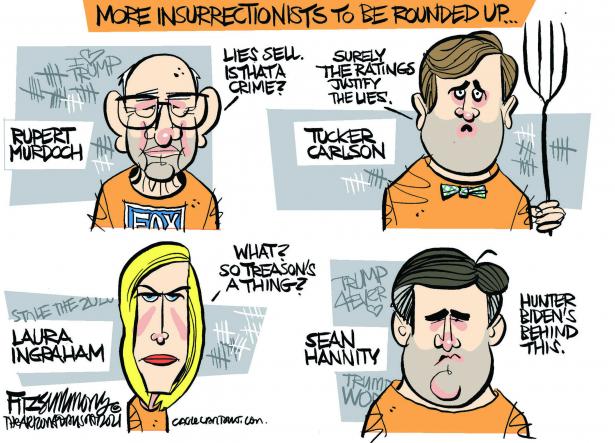- Objectivity in a Time of Moral Collapse
- Class Rage and ‘Us v Them’ Films
- Digital Warmaking
- Feminist Roots of Fan-Made Videos
- DIY ISP
- An Abolitionist Look at “Abbott Elementary”
- Fight Against Internet Censorship Law
- Vermont Media’s Big Difference
- Dominion’s Big Fat Lawsuit Against Fox News
- Fear, Skepticism and New Tech
Objectivity in a Time of Moral Collapse
By Emily Ann Russell
Columbia Journalism Review
Donald Trump’s presidency generated an acute anxiety about objectivity in newsrooms. Throughout his presidency, journalists wrestled with the core tenets of objectivity, balance, and fairness, often suppressing their moral apprehensions toward the Trump administration in an effort to appear legitimate by virtue of neutrality.
Class Rage and ‘Us v Them’ Films
By Vanessa Thorpe
The Guardian
From “Triangle of Sadness” and “Parasite to The Maid”, audiences are revelling in tales of inter-class violence that draw on growing discontent at inequality.
Digital Warmaking
By Sophia Goodfriend
The Baffler
These days, intelligence units are structured in the image of tech conglomerates, and tech conglomerates are contracted to do the work of intelligence units. From Israeli military bases to Silicon Valley corporate campuses, warfare has simply become a white-collar tech job.
Feminist Roots of Fan-Made Videos
By Ashawnta Jackson
JSTOR Daily
“Vidding” is a form of grassroots filmmaking in which clips from television shows and movies are set to music. For women, it’s been an important tool for altering media in a way that “heals the wounds created by the displacement and fragmentation of women on television,” says film studies scholar Francesca Coppa.
DIY ISP
By Jon Brodkin
Ars Technica
Jared Mauch, the Michigan man who built a fiber-to-the-home Internet provider because he couldn't get good broadband service from AT&T or Comcast, is expanding with the help of $2.6 million in government money. Comcast once told him it would charge $50,000 to extend its cable network to his house.
An Abolitionist Look at “Abbott Elementary”
By Eteng Ettah
Scalawag
Without cops or school resource officers roaming the hallway, Abbott invites us into a world that's possibility-laden and imaginative. It asks us both: What does it actually feel like to be a Black student? And: What should it feel like?
Fight Against Internet Censorship Law
By Aaron Mackey
Electronic Frontier Foundation
Two human rights organizations, a digital library, a sex worker activist, and a certified massage therapist filed their opening brief in a case that seeks to strike down the Fight Online Sex Trafficking Act for its many constitutional violations. Their brief explains why the law is a direct regulation of people’s speech, that censors online intermediaries—classic First Amendment violations.
Vermont Media’s Big Difference
By Bill McKibben
The New Yorker
Thanks to some remarkable people, and some good luck, Vermont has new and legacy Web sites, radio stations, and newspapers that keep the state not just informed but knit together. For the moment it shows that the decline of serious local journalism is not as inevitable as some imagine—and that “serious” means several different things.
Dominion’s Big Fat Lawsuit Against Fox News
By David Folkenflik
NPR
Dominion Voting Systems, the election machine and technology company, is seeking to strip away the curtain protecting what happens behind the scenes at the nation's most watched cable news channel, which holds a singular role on the American political scene. The suit could also define what's fair game in journalism and politics in a democracy very much on the edge.
Fear, Skepticism and New Tech
PYMNTS
Whether it’s the cool embrace of fully digital banks, the unavailability of instant payments or wanton cheating within the subscription sector, a distinct “tech disconnect” shows the uneven, inconsistent and often inexplicable relationship we have with our increasingly digital, connected world.


Spread the word